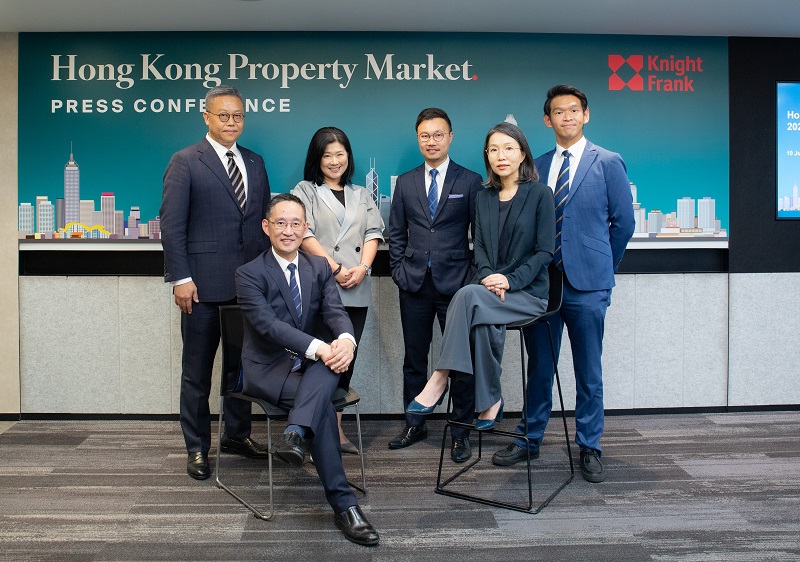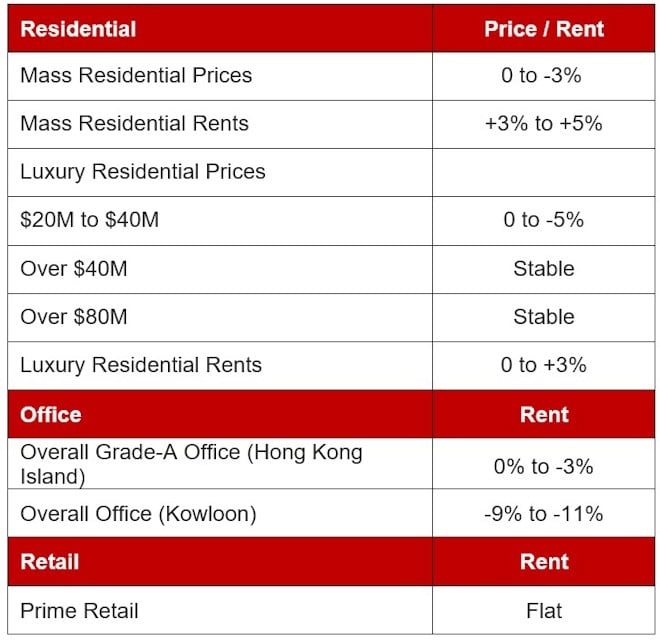
At a press conference held in Knight Frank Hong Kong office on 10 June 2025, Wendy Lau, Executive Director, Head of Hong Kong Office Strategy & Solutions, Steve Ng, Executive Director, Head of Kowloon Office Strategy & Solutions, Russell Lam, Executive Director of Capital Markets, Martin Wong, Senior Director, Head of Research & Consultancy, Greater China, Helen Mak, Senior Director and Head of Retail Services and William Lau, Senior Director, Head of Residential Agency presented their forecasts for Hong Kong’s property market for 2025.Hong Kong Property Market 2025 Forecast:

Hong Kong Residential Market:
Martin Wong, Senior Director and Head of Research & Consultancy, Greater China
The gradual easing of the high-interest environment in Hong Kong is making the residential market more appealing to both end-users and investors. The one-month Hong Kong Interbank Offered Rate (HIBOR) has reached a three-and-a-half-year low, reducing the impact of high-interest rates on property transactions. Despite this positive shift, around 17,500 first-hand stocks remain unsold, with an additional 30,280 new units expected in the coming 18 months. Buyer interest is predominantly directed toward new developments, while second-hand property prices may experience short-term pressure.
Uncertainties surrounding U.S. tariffs and actual cuts in mortgage rates could stabilise Hong Kong home prices. Since the Rating and Valuation Department’s home price index primarily reflects transactions in the second-hand market, mass residential home prices are projected to drop up to 3% this year. With mortgage rates now falling below 3%, borrowing costs have decreased, potentially attracting more investors. Additionally, mass residential rents are expected to increase by 3-5%, driven by demand from overseas professionals and non-local students.
For 2025 to 2026, land sale revenue is forecast to reach between HK$7 billion and HK$9 billion. Meanwhile, land premiums paid for private development are expected to rebound to between HK$8 billion and HK$10 billion.
William Lau, Senior Director, Head of Residential Agency
In the first half of 2025, Hong Kong’s luxury property market experienced increased activity due to a rise in distressed units, which were often sold at lower prices. This attracted cash-rich buyers, creating opportunities for investors to acquire high-value properties at reduced rates. As a result, luxury prices temporarily stabilised. We anticipate a 0% to 5% drop for residential homes priced between HK$20 million and HK$40 million, while homes valued over HK$40 million are expected to remain stable.
Meanwhile, the leasing market has outperformed the sales market, driven by heightened demand from the Top Talent Pass Scheme. The unique characteristics and limited availability of luxury properties have contributed to the stability and strong performance of the luxury leasing sector. Notably, there has been significant activity in Mid-Levels, particularly for units ranging from 800 to 1,000 sq ft, which are popular among families in need of additional storage space. Overall, we expect luxury rents to increase by 0% to 3% this year.
Hong Kong Island Office Market:
Wendy Lau, Executive Director and Head of Hong Kong Office Strategy & Solutions
The first half of 2025 was characterised by some turbulence due to the uncertainty surrounding the global trade war. However, the impact of US tariffs on the office landscape in Hong Kong Island has been limited, thanks to the tenant mix and the ease of the situation. The market movement continues to rely heavily on the economic revival of both Hong Kong and Chinese mainland businesses to generate more organic growth.
Despite the uncertain impact of the US tariffs on office leasing sentiments in Hong Kong Island, the market remains cautious of sudden changes and delayed impacts. Office leasing demand is gradually increasing, primarily driven by the finance sector and PRC companies. Moreover, future supply in Hong Kong Island will continue to be a significant concern for both rental trajectory and occupancy forecasts.
Office rents across all districts are expected to remain downward-oriented, while offices in Wan Chai exhibited greater resilience. The office vacancy rate in Causeway Bay has dropped, and landlords have also noted that while rents from renewals are still declining, the rate of decline has narrowed compared to 2024. We believe the market may remain static, as there is only one major development scheduled for completion – One Causeway Bay in the second half of 2025 in Hong Kong Island. We expect Grade-A office rents on Hong Kong Island to drop by 0% to 3% in 2025.
Kowloon Office Market:
Steve Ng, Executive Director and Head of Kowloon Office Strategy & Solutions
In the first half of the year, the office market in Kowloon faced challenges due to weak sentiment and an oversupply of over 6.7 million sq ft of both new and existing inventory from previous years. Demand remains scattered, and there have been only a few significant transactions. The overall atmosphere is stagnant, with many tenants adopting a cautious “wait-and-see” approach.
Kowloon office rents in June 2025 fell by 3.6% year on year, translating to less than HK$1 per sq ft in absolute figures, which suggests a potential weak trend in the overall market. The office vacancy rate also supports this trend showing only a slight 1.2% increase. Despite a mild drop in office rents and a rise in vacancy, tenant feedback continues to show a lack of confidence in market recovery, with a prevailing sense of caution and anticipation of further decline. This flat trend suggests an ongoing caution, instead of recovery sign.
A significant portion of Kowloon’s tenant mix consists of supply chain-related industries, including manufacturing, trading, and logistics. Even though the US Court has temporarily paused the tariff war, ongoing unilateral trade pressures continue to unsettle these tenants. As a result, office demand is expected to remain weak in the next few quarters. Along with the abundant office supply still swamping the market, we anticipate the office rents in Kowloon to drop by 9% to 11% in 2025.
Hong Kong Capital Markets:
Russell Lam, Executive Director, Capital Markets
In the first five months of 2025, properties valued at HK$100 million or more saw a total transaction volume of HK$14 billion. This transaction volume is on par with the same period in 2024; however, there was a slight 7% decrease in the number of transactions compared to the previous year.
The office sector led the market, accounting for 52% of total activity, driven by strong demand from end-users for discounted and distressed assets. A notable transaction during this period was the acquisition by the Stock Exchange of Hong Kong Limited of levels 42 to 50 of One Exchange Square. Hotel and serviced apartments followed, making up 20% of transactions, and recorded a substantial gain of 430% year on year (YOY). This surge was supported by government initiatives aimed at attracting non-local university students and promoting the Top Talent Pass Scheme. Retail transactions represented 9% of the total, as this sector continued to face challenges due to weak local consumption and high labour costs. Development sites accounted for only 4% of transactions, as soft demand, high development costs, and uncertain land conditions continued to affect investor confidence.
Looking ahead to the rest of 2025, the focus is expected to shift towards student accommodation and education-related assets. This change is driven by the government’s plan to launch a pilot scheme that facilitates the conversion of hotels and other commercial properties into student hostels. Furthermore, the Hong Kong government has pledged full support to the city’s universities in attracting foreign students, especially in light of recent changes to U.S. student visa policies for Chinese students, which are expected to further stimulate demand for student accommodation.
Hong Kong Retail Market:
Helen Mak, Senior Director, Head of Retail Services
Hong Kong’s retail market is facing a significant downturn, with total retail sales in the first four months of 2025 dropping by 5.6% YoY to $28.9 billion. This decline impacts not only luxury goods, but also everyday necessities sold in supermarkets. Though, total retail sales for the year may still be able to remain stable, which is expected to increase pressure for rent adjustments and price changes.
The retail industry in Hong Kong is facing challenges due to lower consumer confidence, driven by a 22-year peak in the number of residential mortgage loans in negative equity. As a short-term recovery in home prices appears unlikely, consumer spending remains sluggish, hindering retail expansion. Unfortunately, several well-known retail establishments such as F&B and cinema chains have succumbed to these challenges. Additionally, global economic uncertainty and the underperformance of the local residential market are accelerating the trend of downgraded consumption in Hong Kong.
For the past 20 years, Hong Kong has been a premier destination for mainland visitors. However, shifts in their shopping habits and an increasing interest in cultural experiences have transformed our retail landscape from traditional shopping to a focus on sightseeing. As part of this transformation, we recognise that retail properties need to adapt to this changing environment. Rather than solely focusing on selling products, these retail spaces should serve as showcases for retailers to connect with their customers. This shift may result in lower rental prices and a decline in retail property values, but it would also open up opportunities for more creative uses of space. Overall, retail consumptionin Hong Kong has not recovered as expected, and we anticipate that the retail rental market will remain stable in 2025.












